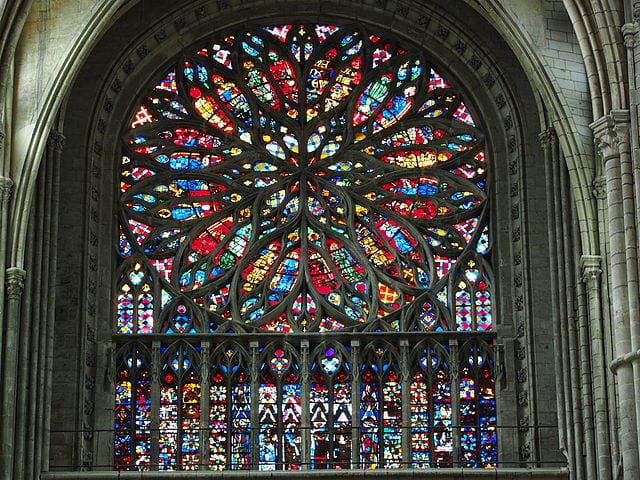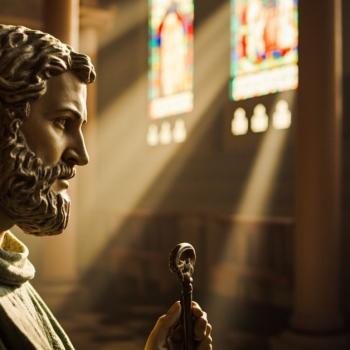
“BWL” attends a Lutheran church. His words will be in blue.
* * * * *
The argument you are making is that sola Scriptura doesn’t work because of the divisions among those who claim to adhere to it and the absence of any way (and especially any authority) to end said divisions. But churches who deny sola Scriptura and claim to adhere to Tradition are also in the same boat.
First of all, let everyone note what was done here (which is usually done): rather than deny the assertion and show that Protestantism does indeed have a way out of the dilemma, you immediately switch the matter back to Catholicism. That’s fine in and of itself. Fire away! But it is no answer to an internal suggested problem of Protestantism to simply point out a possible internal problem of Catholicism. This is a variation of the old “your dad’s uglier [or just as ugly] as mine” approach.”
And that’s part of what I mean when I say that Protestants never address the thorny problems of sola Scriptura head on. Almost always it is a diversionary tactic, or recourse to Pope Honorius or the sexual scandal or some such ploy to avoid dealing with severe problems inherent in sola Scriptura. Just look at how the Protestants in this forum are acting when the topic comes up: they’re all squirming: even outwardly so (don’t get me wrong: I greatly appreciate the honesty of admitting that one is troubled by something). In any event, there is no doubt that it remains a huge problem for Protestants to resolve for themselves.
That said, I strongly deny that we are all “in the same boat” in this regard.
So the same question could be asked of you: how do non-Protestant Christians decide between Catholicism, Orthodoxy, the Coptic church, the Old Catholics, etc.?
The arguments are long, complex, and elaborate. There are no simple answers to be given that anyone should be convinced by. But I think that with proper study of all sides, one can be given enough information to make a good comparison of competing viewpoints and make the most plausible choice. I’ve shown, I believe, that the papacy is explicitly biblically grounded, and that it developed in a consistent, sensible manner throughout Church history. It was part of Church policy and organization and the bulwark of orthodoxy. So to simply cut it out and separate from it doesn’t make sense to me because it is not a consistent development of what was before. The same holds true of ecumenical councils. Orthodox and Protestants (to differing degrees) value the early Church councils.
Everyone spoke of one Church in those days, yet later on it somehow gets split. Well, who is it that continues to have a pope and ecumenical councils, just as in the first millennium? It ain’t the Orthodox or the Protestants! So, although it might still be argued that something fundamental changed so that Vatican II is a completely different species than Nicaea, at least we have councils. A group that doesn’t has to explain why they were normative before but not now (except in Catholicism).
I don’t know much about the Copts, and so I can’t speak about them. The Old Catholics refused to accept papal infallibility, which wasn’t invented in 1870, but rather, was in place (practically speaking) for a long time, and was a perfectly consistent development of papal supremacy. The Council decided that this was to be a de fide dogma (just like the early councils). The Church spoke. The Old Catholics didn’t like it and split, just as all the heretics through the centuries had done: they knew better than the Church.
It’s rather obvious, then, that they are not the “mainstream” because (again) they changed what had been received Tradition. Continuity is the key. That’s apostolic succession and development of doctrine. It’s how we know what the Church and True Christian Tradition is. Thus taught St. Paul and the Fathers, and the Catholic Church today.
Etc., etc., etc.
And it’s worth pointing out that at least for the RC, EO and Copts, they all were around before the Reformation (meaning divisions were not new before then) and all claim to be “the church” as well.
I think the Orthodox are certainly part of the Church. They don’t have a correct view of the papacy, from our perspective, but they are part of us. There are other issues many of which are highly abstract or merely cultural but that is the basic difference.
In addition, if Protestantism is wrong, how is a Protestant suppose to decide between these churches who are all ancient and all claim Tradition?
I’ve given a “nutshell” answer. The long answer is found in many many of my papers. Like I said, it is too serious an issue to trivialize by trying to give short, pat answers to it.
I don’t think that I would have the time to engage all of your arguments. I do have a job after all and this is just something I do on the side.
That’s fine, but it remains true that in order to decide vexing, complex issues, we all have to devote considerable time, just as we went to school for thousands of hours to learn things. Theology, Bible study, and historical study are no different. It’s irrelevant to me whether you work through all these things with me or not, but I contend that you must work through them in depth in some fashion if you hope to resolve these difficulties that you frankly admit exist in your viewpoint.
[older comment of mine] That is the bottom-line issue that both sides need to address, but if one side refuses to engage the most serious critiques of its fundamental principle and rule of faith, then what does that tell us? To me, it indicates that it is an indefensible system, with false premises, and that is not something I would want to be a part of. I would either seek to defend and uphold it or get out and adopt a more feasible and plausible position.
Well, I’m not so sure about this. James White frequently goes around crowing about how Catholics haven’t properly addressed his critiques, etc.
Except with me (and several others I know of). In my case, he flees for the hills and tries to pretend that I haven’t refuted him time and again. It remains a simple, indisputable, easily documented fact that no Protestant has sustained a defense of sola Scriptura in the face of one of my critiques. This includes at least two people who wrote master’s theses on the topic, one who was the editor of the New Treasury of Scripture Knowledge (brother of a good Baptist friend of mine: Jerome Smith), folks like Keith Mathison (who has a doctorate), and others of like education (though that was recent; frankly, I don’t expect him to be any different; maybe he’ll pleasantly surprise me. I hope so).
They were in the position to give the best answer. But even they couldn’t do so. That’s not because they are ill-equipped. It’s because you can only get so much mileage out of something that isn’t true. When you have to make a case out of something so incoherent, it is extremely hard work. I don’t blame anyone for not wanting to do so. But I eventually blame them if they refuse to acknowledge the problem and don’t try to rectify it in their own spiritual life and theological outlook.
Granted, he is a real blowhard, but this is what a lot of people on both sides say.
Yes, they do. I can document everything I say. Many people have learned this the hard way. Like Dizzy Dean used to say, “it ain’t braggin’ if you can do it!”
My case, however, is a bit more complicated. My wife and family aren’t too thrilled with Lutheranism, much less Catholicism. So part of the reason I’m Protestant is not simply because of certain doubts about Catholicism (which are much fewer than about Baptistic Evangelicalism), but because of worries about marital / family problems that would ensue if I ever left Protestantism.
That’s between you and God, and your family. Speaking for myself only, I would always maintain that an individual must follow his conscience, no matter what, and should convince others that he or she ought to be allowed to do so, but there are many situations, and wisdom and prudence dictate different responses or speeds of certain “moves” in different circumstances (also I didn’t have to face these difficulties in my conversion, and so don’t feel that it is my place to “lecture” others about it).
May God bless you as you seek God in deciding what is best for your family. Only God knows all the variables and factors. No one else does. I’m just an apologist making my defense of what I believe. Conversion is the work of the Holy Spirit and cannot be coerced or forced or made to happen “before its time,” so to speak.
***
(originally 8-11-05)
Photo credit: Alf van Beem (9-6-13). Amiens Cathedral, France [Wikimedia Commons / Creative Commons CC0 1.0 Universal Public Domain Dedication]
***
















